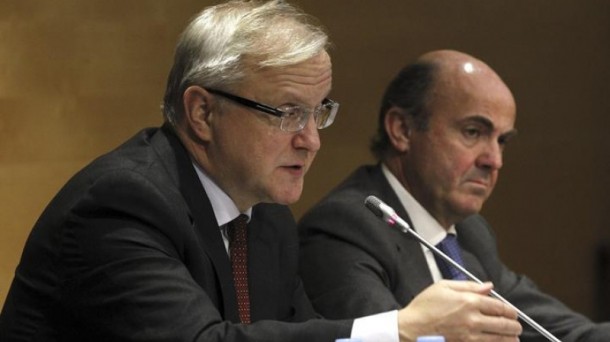Business
Economic crisis
EU urges Spain to take more measures to fight unemployment
APTN
Madrid
Spain's unemployment rate now stands at 26.6 percent and is the highest overall rate in the EU, up 3.6 percent over the last year.
-

Ollie Rehn and Luis De Guindos Photo: EFE
The European Union's Commissioner for Economic and Monetary Affairs said on Monday that Spain's austerity measures "will bear fruit even if it will take some time."
"I am confident that it will be also the year in which the corner is turned, in which Spain and the Eurozone, as a whole can move from stabilisation to a sustained recovery," Ollie Rehn said at a joint news conference with the Spanish Finance Minister Luis De Guindos in Madrid.
Mariano Rajoy's year-old conservative government has made financial reforms and applied severe austerity measures, cutting wages and raising taxes in hopes of a turnaround in Spain.
Rehn acknowledged the labour market reform has been moving forward but stressed it needed "to be complemented with policies to help unemployed or to find new training opportunities."
Spain's unemployment rate now stands at 26.6 percent and is the highest overall rate in the EU, up 3.6 percent over the last year.
The country is also in its second recession in three years following the collapse of its once-booming real estate sector.
"Without any doubt, the greatest social, economical and political scourge that Spain has, and that's the greatest government concern, is the 55 percent of youth unemployment," De Guindos said.
The unemployment rate of 26 percent for the whole active population is largely a consequence of that 55 percent of youth unemployment," he said.
Heavily indebted countries such as Spain and Italy had faced alarmingly high borrowing costs on bond markets last year, as investors wondered whether they would be able to keep paying their debts.
Those bond market rates fell after key steps by European leaders. One was the European Central Bank's offer to purchase bonds issued by indebted countries if they promise to reduce their deficits.
Another was a proposal to set up a so-called banking union that would keep failed banks from bankrupting any one country by transferring the supervision of bank behaviour and finances to a single, central EU supervisor at the ECB.
De Guindos warned that the bond market rates had not fallen far enough however. "I would not be so optimistic to say that finance pressures have disappeared. Spain still has a spread of 350 points. Without any doubt, we are better than a month ago, but still there is a lot to do," he said.
Rehn's visit to Madrid coincided with the arrival of delegations from the European Commission, European Central Bank and International Monetary Fund to inspect whether Spain is complying with conditions set for a 40 billion bailout of its banks.
top stories



-
news
New anti-eviction law
Andalucia begins proceedings to seize confiscated houses from banks
-
news
London attack
British police ponder conspiracy after soldier murder
-
Sport
Giro d'Italia
Nibali tightens grip on overall lead after stage victory
© EITB - 2024 - Privacy Policy - Legal disclaimer - Cookie Policy - Cookie settings


